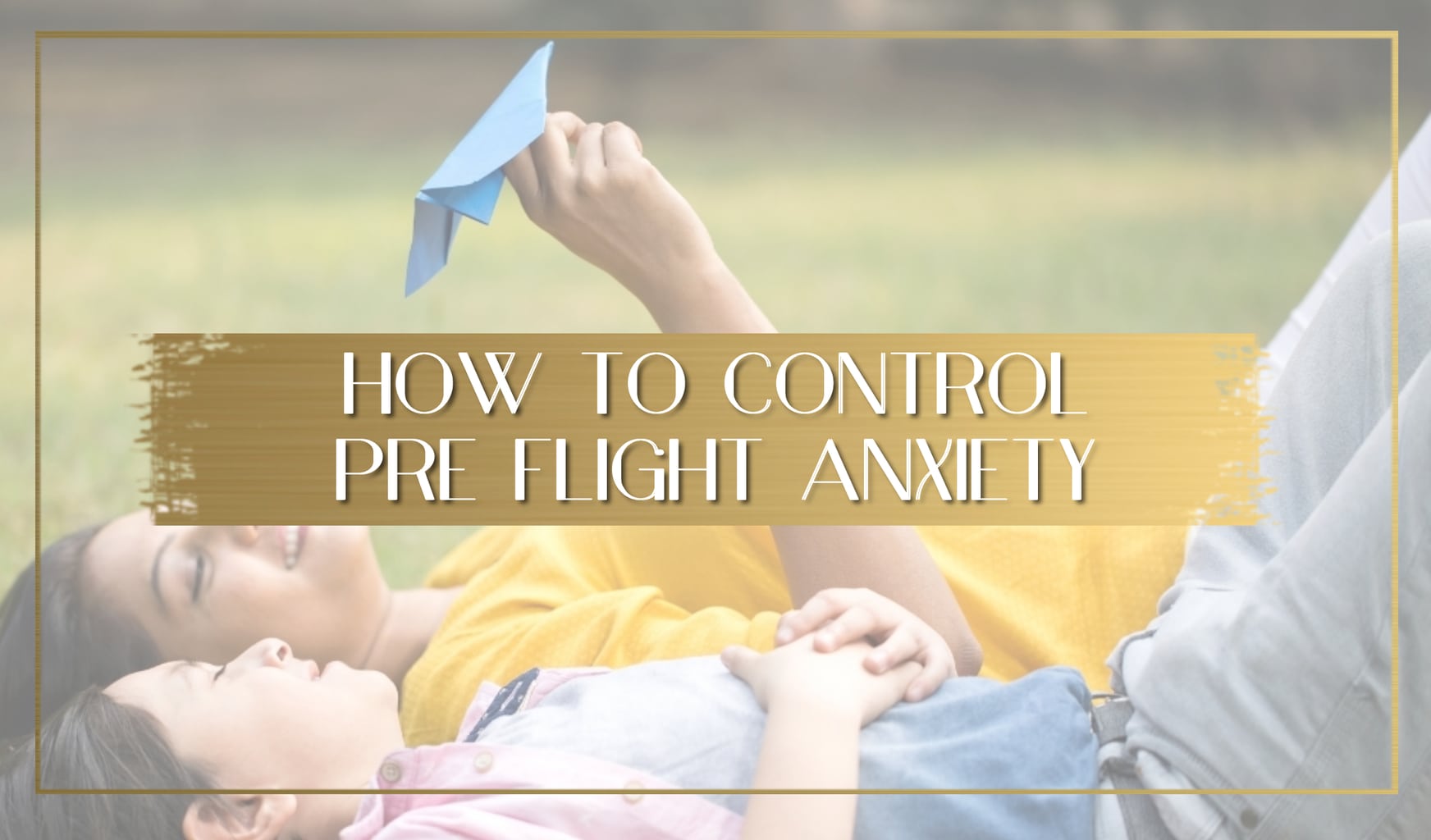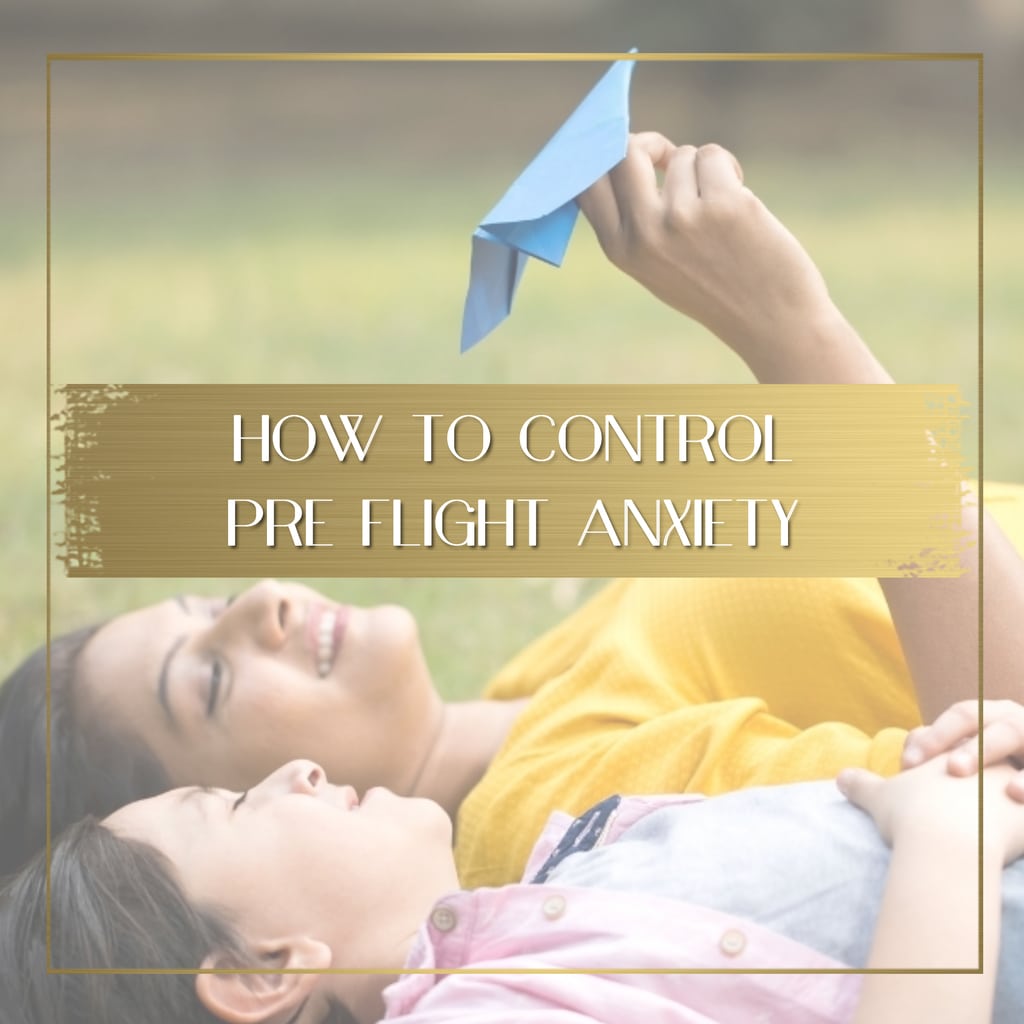
Have you ever been preparing for a flight and suddenly a “what if” thought pops into your head. The single thought multiplies and amplifies until you have full blown anxiety about a flight that you haven’t even started yet.
This is known as anticipatory anxiety, an offshoot or symptom of generalised anxiety. AnxietyUK defines it as “experiencing increased levels of anxiety by thinking about an event or situation in the future”. So basically, even thinking about placing your foot on the plane ignites anxiety even if you’re sitting on the beach.
The first time I flew in a seaplane in the Maldives, I must admit I anticipated the worst. In the end it was an amazing experience. The best thing here to know is that with a few basic tools and some practice, anticipatory anxiety can be overcome. In this article we’ll guide you in the practical and mental steps needed to start your full recovery!
Understand your triggers & symptoms
The first thing to do is ask yourself, “Why am I scared of flying?” This may seem simple, but often enough we fear things without ever considering what it is we actually fear. Are you really scared of flying or are you afraid of being far from home? Do you fear a terrorist attack? Do you have social anxieties?
Maybe you are a germaphobe and think you’ll get some foreign disease if you fly in a cramped space. Or maybe you do actually fear all the things that can go wrong with the aircraft like turbulence, explosions, fire or crashing. Write all the things you hate about flying and rate them from a scale of slightly scared to full blown panic-inducing.
Now that you have it all displayed in front of you, consider what could trigger you to have these feelings. Could it be a film about aircraft, images of planes, sensations brought about by thoughts of being in the aircraft or experiencing one of your deepest fears. Do you just have a general fear of heights. Or are you superstitious, believing that if you just think something bad on the plane, this is a prediction of catastrophe.
You can now move from internal to external, considering your physical symptoms that develop when you get anticipatory anxiety. Do you hyperventilate or do your muscles twitch and spasm? Maybe you find it difficult to concentrate on other things or get chest pain. Learn how you feel inside and out when you think about flying.
Knowing yourself is the first step in overcoming anticipatory anxiety. The more you know about yourself, the better you are at redirecting your thoughts and feelings before the start to grow. This brings us to our next point, knowledge is key.
Gain knowledge about anxiety
Anxiety leeches onto ignorance, starting with that “what if” thought and spiraling into a massive catastrophic black hole. Yet if you can answer that “what if” thought the moment it pops, you can overcome that spiral into darkness.
If you want to know how to answer those questions, there is no quick and easy way to do it, but if you put in the effort and time in studying anxiety you will slowly learn how to manage it. It’s important to know that anxiety happens to all of us, it’s a part of our evolutionary mechanisms to escape dangerous situations. With many people it comes and fades away like other emotions, but it becomes a disorder when it stays and ruminantes in our minds and bodies.
The interesting thing is that most people don’t even fear the act of flying, they fear that they will become overwhelmed with anxiety during the flight. So you’re basically getting anxiety about getting anxiety.
Try to learn all about airplanes like how they fly, facts about turbulence, why the aircraft makes certain sounds during the flight, or statistics about how many negative events actually occur in the real world.
Maybe you’d like to try out a virtual reality program, exposing yourself to a realistic computer simulation. You may be asking yourself if you can do this alone. And the answer is affirmative, but it’s always best to get a professional guide to help you on your adventure.
Seek professional help
You may wish to do your own research online or at the library, but it’s always best to let an expert guide you on your path to recovery. It is possible to become the master of your anxiety, and a little help never hurts. So how do you find a therapist to help you with anxiety? Here are some pointers to look out for from experts in the field, BetterHelp.
If you keep avoiding your fears, they will intensify and a slight fear of flying can build and build and start affecting your life negatively where you can’t even go on a vacation with your family. The opposite of avoidance is exposure, and the best way to expose yourself to your feared triggers is through therapy.
You can try out more traditional methods like talk therapy or cognitive-behavioral therapy (CBT) which helps to desensitize your triggers through changing your thought patterns. Maybe you need the help of a community and you’d like to try out group therapy, meeting at an airport and culminating in a final group flight with your group and therapist.
You could just pop a pill, but we are strong believers in overcoming anxieties at the core which leaves no room for addiction as you confront your demons head-on. Or maybe you’d like to combine medication like an SSRI or SNRI with therapy for short and long-term effectiveness.
Decide to commit no matter what
Commiting to a decision is a strong way to prevent anticipatory anxiety. When you tell yourself that you will do something no matter what an interesting event takes place in your brain. Your strong decision tells the “fight or flight” part of your brain (called the amygdala) to stop releasing stress hormones.
If you’re constantly on the fence about whether you’re going to fly or not or considering changing your mind, your brain will be in a constant state of stress, causing anxiety. Trick your brain into calming down by telling yourself each day that you are committed to flying no matter what. Some of my favorite experiences were flying in helicopters, even though the thought of it terrified me. But after committing, focusing on the positives, I felt calmer and more confident, even the treacherous landing at Everest Base Camp!
It’s important to know that commitment shouldn’t be confused with control. You may commit to something without being able to control it. So if you commit to taking that flight, you will need to keep in mind that some things are still out of your control, like turbulence, cramped spaces or germs.
Know the difference between danger & fear
While your body may react in exactly the same way to both fear and danger, you will need to learn the differences between them in order to stave off anxiety. Think about it this way. You could be sitting on your sofa, sipping a calming camomile tea and listening to New Age tunes when a thought of boarding a plane pops up and you begin to feel anxiety.
In this situation, you are perfectly safe in your home, but you feel like you are in danger. This has a knock-on effect, making your body react as if you were being chased by a lion. Adrenaline starts to pump and your digestive system stops. You are tricking yourself into thinking that you are in danger.
At this point, people with anxiety will start to spiral, thinking that there may be something wrong with themselves such as a heart attack. Mostly you are fine and just need to get rid of this excess adrenaline by going for a quick run or doing some jumping jacks. Having nothing to do is also a possible trigger, so keep yourself busy at home so that you keep your mind active.
Understand that you will need to start labeling your fear as anxiety and not danger. Write your thoughts down in a journal or talk to yourself if need be, saying that anxiety is causing these strange sensations, all the while reminding yourself that you are not in actual danger. You are safe even if you are feeling intense anxiety.
